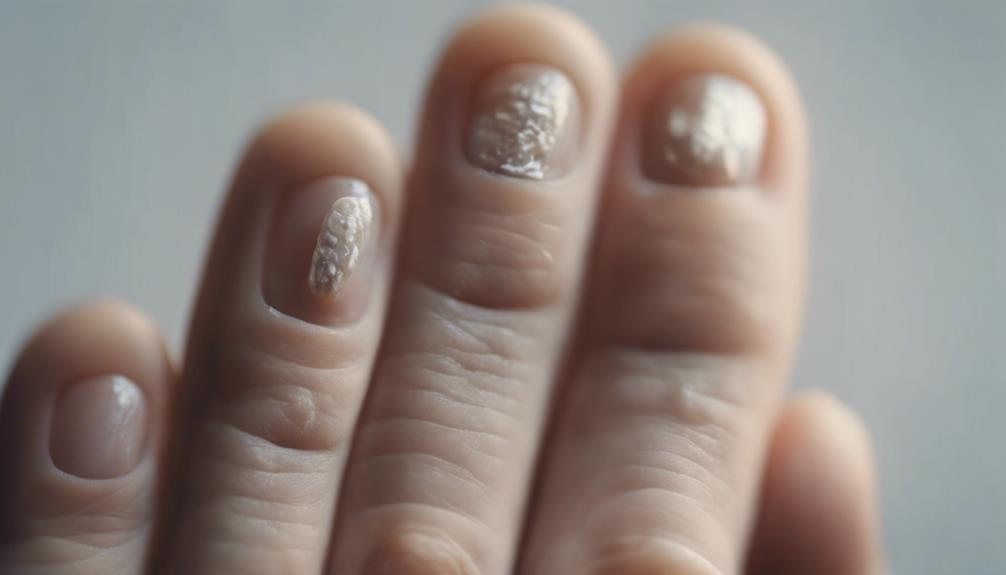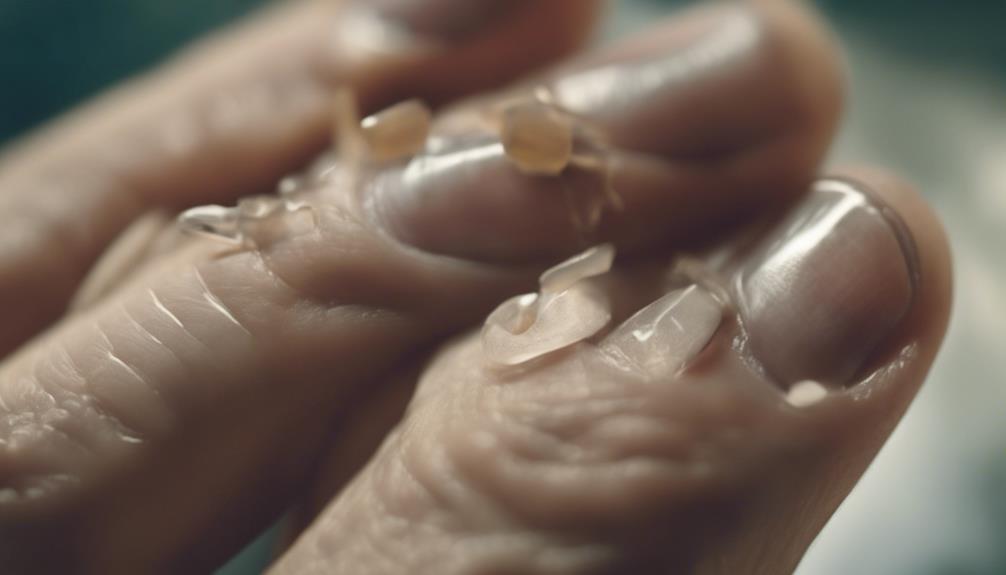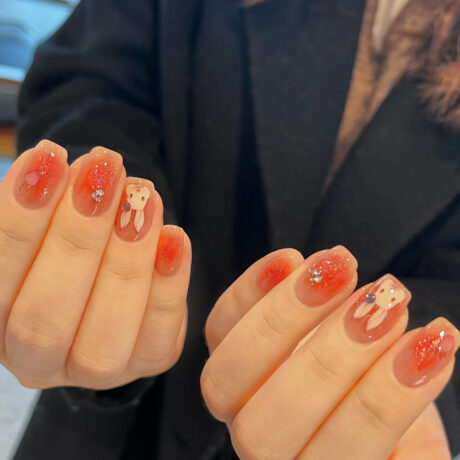What Deficiency Causes Nails Stop Growing?

Deficiencies in nutrients like iron, B vitamins, protein, zinc, vitamin C, and omega-3 fatty acids can hinder nail growth. Iron is vital for oxygen transport to cells responsible for nail growth. B vitamins and protein support healthy nail development. Zinc impacts keratin formation crucial for nail strength. Vitamin C affects nail growth rate and collagen production. Omega-3 fatty acids support nail health. Maintaining a balanced diet rich in these nutrients is essential for optimal nail health.
Key Takeaways
- Iron deficiency can cause slow nail growth due to decreased oxygen delivery to cells.
- Lack of B vitamins can lead to brittle nails and hormone imbalances affecting growth.
- Protein deficiency may hinder nail growth as the body prioritizes other functions.
- Zinc deficiency impacts keratin formation essential for strong nails and can slow growth.
- Vitamin C deficiency can affect nail growth rate by impacting collagen production.
Iron Deficiency

Experiencing an iron deficiency can impede the growth of nails due to its crucial role in supporting the body's overall physiological functions. Iron is essential for carrying oxygen to cells, including those responsible for nail growth. Insufficient iron levels can lead to anemia, a condition that hinders the body's ability to produce healthy red blood cells. Anemia prevention is key to maintaining optimal nail health and ensuring proper growth.
To combat iron deficiency and promote nail growth, incorporating iron-rich foods into your diet is vital. Foods such as lean meats, spinach, lentils, and fortified cereals are excellent sources of iron that can help boost levels in the body. Pairing these iron-rich foods with vitamin C-rich options can enhance iron absorption, further supporting nail health and growth.
Vitamin B Deficiency
Vitamin B deficiency can significantly impact nail growth as these vitamins play a crucial role in promoting healthy nail development.
Understanding the importance of Vitamin B in maintaining strong and resilient nails is key to addressing any deficiencies that may be hindering growth.
Exploring remedies for Vitamin B deficiency can help individuals support optimal nail health and growth.
Nail Growth Impact
Insufficient intake of certain B vitamins can significantly impact the growth and health of nails. Vitamin B plays a crucial role in maintaining hormone balance, which is essential for promoting healthy nail growth. Hormone imbalance can lead to issues like slow nail growth or brittle nails.
Moreover, stress levels can also affect nail health. B vitamins are known to help regulate stress levels, and when there is a deficiency, nails may become weak and prone to breakage.
Therefore, ensuring an adequate intake of B vitamins through diet or supplements is vital for supporting optimal hormone balance and managing stress, ultimately contributing to healthy nail growth and overall nail health.
Vitamin B Importance
Adequate levels of B vitamins are essential for maintaining optimal hormone balance and supporting healthy nail growth. Among the various B vitamins, biotin stands out for its remarkable benefits in promoting strong and resilient nails.
Biotin, also known as vitamin B7, plays a crucial role in the metabolism of fats, proteins, and carbohydrates, which are essential for healthy nail development. Additionally, niacin, or vitamin B3, found in sources like meat, fish, and nuts, contributes to improved blood circulation, ensuring that the nails receive an adequate supply of nutrients for growth.
Ensuring a sufficient intake of B vitamins through a balanced diet or supplements can help prevent deficiencies that may impede nail growth and overall nail health.
Remedies for Deficiency
To address deficiencies in vitamin B that may hinder nail growth, incorporating nutrient-rich foods like whole grains, legumes, and leafy greens into your diet can help replenish essential B vitamins necessary for optimal nail health. Additionally, considering herbal remedies and dietary supplements rich in vitamin B can aid in restoring levels to promote nail growth. Lifestyle changes such as reducing stress levels and maintaining proper hydration can also positively impact nail health. In more severe cases, professional treatments like vitamin B injections may be recommended. Below is a table listing some foods high in vitamin B that can aid in addressing deficiencies:
| Food | Vitamin B Content | Benefits |
|---|---|---|
| Salmon | B12 | Supports nail strength and growth |
| Spinach | B9 | Enhances overall nail health |
| Lentils | B1, B9, B12 | Promotes nail growth and repair |
| Sunflower Seeds | B1, B6, B9 | Helps prevent nail brittleness |
| Greek Yogurt | B2, B12 | Supports healthy nail development |
Protein Deficiency
A diet lacking in sufficient protein can contribute to slowed nail growth. Protein is essential for various bodily functions, including hair growth and muscle repair. When the body lacks an adequate amount of protein, it may prioritize other functions over nail growth, leading to weaker and slower-growing nails.
Proteins are made up of amino acids, which are the building blocks of tissues in the body. Hair follicles require protein to grow hair, and muscles need protein for repair and growth. When protein is in short supply, the body may allocate the available protein to these critical functions, leaving nails with less protein for optimal growth.
To ensure healthy nail growth, it is important to include an adequate amount of protein in your diet. Sources of protein include lean meats, poultry, fish, eggs, dairy products, legumes, nuts, and seeds. By maintaining a balanced diet rich in protein, you can support not only nail growth but also overall health and wellness.
Zinc Deficiency

Zinc is an essential mineral for nail health, and its deficiency can lead to slowed nail growth and weakened nails. Symptoms of zinc deficiency include white spots on the nails, brittleness, and slow nail growth.
Incorporating dietary sources of zinc such as meat, nuts, seeds, and legumes can help maintain healthy nail growth.
Impact on Nail Health
Insufficient levels of zinc in the body can significantly impact the health and growth of nails. Zinc plays a crucial role in the formation of keratin, the protein that makes up nails. A deficiency in this essential mineral can lead to brittle nails that are prone to breaking and slow growth. To maintain optimal nail health, incorporating zinc-rich foods like nuts, seeds, and legumes into your diet is essential. Additionally, practicing healthy habits such as keeping nails clean and properly trimmed, avoiding harsh chemicals, and using moisturizer can help support overall nail care.
| Importance of Zinc for Nail Health | Examples of Zinc-Rich Foods |
|---|---|
| Formation of keratin | – Almonds |
| Strengthens nails | – Pumpkin seeds |
| Promotes growth | – Chickpeas |
| Prevents brittleness | – Lentils |
| Supports overall nail health | – Cashews |
Symptoms of Deficiency
What are the common signs and symptoms that indicate a deficiency in zinc levels within the body and its potential impact on nail growth and health?
Zinc deficiency can manifest through various symptoms, including brittle or slow-growing nails. This nutrient plays a crucial role in supporting overall nail health by aiding in the absorption of essential nutrients and preventing hormonal imbalances that could hinder nail growth.
When the body lacks sufficient zinc, it may struggle to absorb other vital nutrients necessary for strong and healthy nails. Furthermore, hormonal imbalances resulting from zinc deficiency can disrupt the nail growth cycle, leading to issues like brittle nails that are prone to breakage.
Recognizing these symptoms early on can help address the deficiency and promote optimal nail health.
Dietary Sources of Zinc
Adequate intake of specific foods rich in essential minerals can significantly contribute to addressing deficiencies that may lead to impaired nail growth, such as zinc deficiency. Zinc-rich foods offer numerous benefits beyond just promoting healthy nail growth, including supporting the immune system and aiding in wound healing. Some common dietary sources of zinc include oysters, beef, pumpkin seeds, and chickpeas. For individuals who may struggle to meet their zinc requirements through diet alone, supplement options are available. It is recommended to consult with a healthcare provider to determine the appropriate dosage of zinc supplements, as excessive intake can lead to adverse effects. Ensuring a balanced diet that includes zinc-rich foods is essential for overall health and optimal nail growth.
| Zinc-Rich Foods | Benefits |
|---|---|
| Oysters | Immune support |
| Beef | Wound healing |
| Pumpkin Seeds | Skin health |
Vitamin C Deficiency

A deficiency in vitamin C can significantly impact the rate at which nails grow. Vitamin C plays a crucial role in collagen production, a protein essential for nail health. Collagen provides structure and strength to nails, promoting their growth and preventing brittleness.
Additionally, vitamin C is renowned for its antioxidant benefits. Antioxidants help protect cells, including those responsible for nail growth, from damage caused by free radicals. Without an adequate supply of vitamin C, the body may struggle to produce sufficient collagen, leading to slower nail growth and potential issues like weak, dry, or brittle nails.
To maintain optimal nail health and growth, it is important to ensure an adequate intake of vitamin C through a balanced diet or supplementation when needed. Including vitamin C-rich foods such as citrus fruits, strawberries, bell peppers, and leafy greens can help support healthy nail growth and overall well-being.
Omega-3 Fatty Acid Deficiency
Omega-3 fatty acids are vital for supporting nail growth and health due to their role in maintaining proper cell function and promoting overall well-being. These healthy fats are essential for various bodily functions, including the health of your nails. Omega-3 fatty acids have been linked to numerous benefits, including skin benefits.
When it comes to nail health, omega-3 fatty acids help in keeping the nail bed hydrated and nourished, which is crucial for promoting nail growth. Additionally, omega-3 fatty acids possess anti-inflammatory properties that can help combat any inflammation that may be hindering nail growth.
Incorporating sources of omega-3 fatty acids into your diet, such as fatty fish like salmon, walnuts, chia seeds, and flaxseeds, can significantly impact the health and growth of your nails. Ensuring an adequate intake of these essential fatty acids not only benefits your nails but also contributes to overall health and well-being.
Frequently Asked Questions
Can Stress or Hormonal Imbalances Also Cause Nails to Stop Growing?
Stress management and hormonal balance play crucial roles in overall health, potentially affecting nail growth. Adequate vitamin intake and protein consumption are essential for nail health. Prioritizing self-care, balanced nutrition, and seeking professional guidance can support healthy nail growth.
Are There Any Lifestyle Habits That Can Contribute to Nails Not Growing?
Lifestyle habits such as poor diet choices, lack of exercise, disrupted sleep patterns, and inadequate hydration levels can all contribute to nails not growing as they should. Maintaining a balanced lifestyle is key for optimal nail health.
How Can You Tell if Your Nail Growth Issue Is Due to a Deficiency or Another Underlying Health Issue?
In the realm of nail care and maintenance, unraveling the mystery behind stunted nail growth requires a discerning eye. By recognizing signs like brittle nails or discoloration, one can navigate through the labyrinth of deficiencies or underlying health issues.
Are There Any Natural Remedies or Supplements That Can Help Promote Nail Growth?
For promoting nail growth naturally, consider incorporating herbal remedies, vitamins, and essential oils into your routine. A balanced diet rich in nutrients such as biotin, zinc, and iron can also support healthy nail growth.
Are There Any Specific Foods That Should Be Avoided to Prevent Nail Growth Issues?
Diet choices play a crucial role in nail health. To promote nail growth, avoid excessive intake of processed foods high in sugar and unhealthy fats. Opt for a balanced diet rich in vitamins, minerals, and proteins to support strong and healthy nails.
Conclusion
In conclusion, various deficiencies can contribute to nails ceasing to grow. These include iron, vitamin B, protein, zinc, vitamin C, and omega-3 fatty acid deficiencies.
One interesting statistic is that iron deficiency affects approximately 1.62 billion people worldwide, making it one of the most common nutrient deficiencies globally.
It is essential to address these deficiencies through proper nutrition and supplementation to support healthy nail growth.




